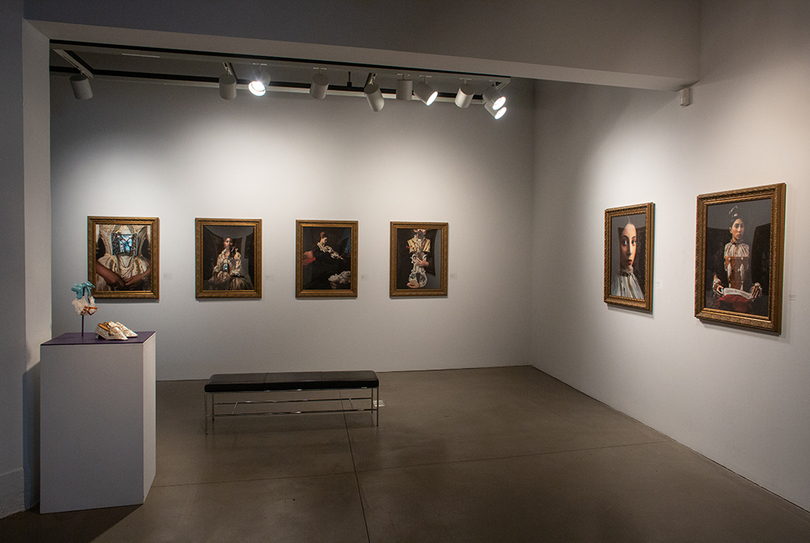Haitian artist’s exhibit reflects on Black identity in Western civilization

Courtesy of Point of Contact Gallery
Rewriting History has been on display at Point of Contact since Sept. 17 and will stay until Friday. The exhibit explores the relationship between history, memory and identity.
The Daily Orange is a nonprofit newsroom that receives no funding from Syracuse University. Consider donating today to support our mission.
In a video tour of Haitian artist Fabiola Jean-Louis’ exhibit, the camera pans to the display of an elegant floor-length gold and white striped paper gown. Jean-Louis hand-painted the white sheets that make up the dress with flower details, tiny white lines and gold strips.
This paper gown is one of the handmade pieces in the Rewriting History Exhibit at Point of Contact Gallery. The gowns, which Jean-Louis created, are on display in the gallery among photographs of Black women wearing them.
Rewriting History has been on display at Point of Contact since Sept. 17 and will stay until Friday. The exhibit explores the relationship between history, memory and identity.
At the start of a virtual tour on Thursday, panelist and Syracuse University doctoral candidate Shana Gelin said in her voice-over that Jean-Louis’ work revives the Black beauty that Western civilization has cast aside.
“Rewriting History is pure alchemy, true Black magic. It summons people to critically acknowledge (the) passion and oppression of Black people by empowering individuals to see that the experiences of Black women are not linear but unconditioned,” Gelin said during the panel introduction.
During the panel discussion, Jean-Louis said that using the European lens to show Black power removes the blame from the victim and places it “where it belongs.”
Tanisha Jackson, the executive director of Community Folk Art Center and a professor of practice in the Department of African American Studies, was one of the panelists for the Rewriting History exhibit. In individual essays about the exhibition, each panelist wrote about how different aspects of the exhibit are examples of rewriting history, she said in an interview. The panelists’ essays served as voice-overs during the virtual gallery video.

In a video tour of Haitian artist Fabiola Jean-Louis’ exhibit, the camera pans to the display of an elegant floor-length gold and white striped paper gown. Courtesy of Point of Contact Gallery
Much of traditional and classical art history, such as Renaissance and Baroque art, whitewashed Black women, which resulted in a lack of paintings representing Black women from that time, Jackson said. Jean-Louis’ art brings visibility to Black women of that time period by putting them in period style dresses.
“I definitely appreciate her efforts to provide a platform for Black female subjects to give voice and space to Black women and to address the erasure,” Jackson said in an interview.
Sara Felice, the director of Point of Contact, said that Jean-Louis’ work addresses many difficult yet relevant topics and conversations around racial justice and the representation of Black women.
Jean-Louis’ work comes at a “crucial time,” and a lot of the discussion of her work revolves around race and racial identity in the treatment of others, Felice said during the panel.
Jean-Louis said that it is important to respond to what is happening at this time and that she hopes that is what her work is able to accomplish.
“It’s somehow speaking to not just all the other things that I spoke to, but it gives a little solace even in the times of stress and trauma that we’re going through currently,” Jean-Louis said. “But I do believe that staying silent as a Black woman for me, it’s just not an option.”





